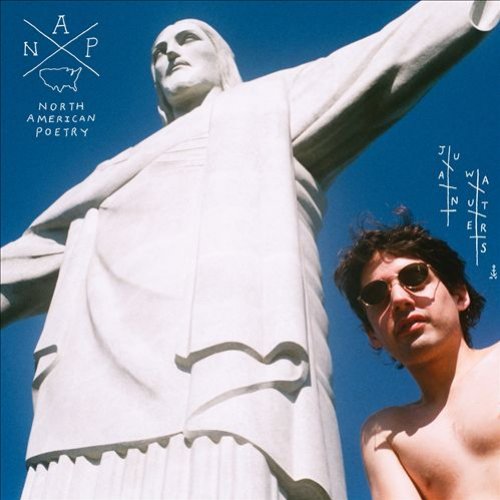
Juan Wauters
N.A.P. North American Poetry
(Captured Tracks; 2014)
By Maura McAndrew | 5 March 2014
If Juan Wauters’s debut solo album N.A.P. North American Poetry has a theme, it’s cycles, circles: repetition with the same old result. He sums this up in a few lines, first uttered on opener “Let Me Hip You to Something” and again, later in the record, as the coda to “Continue to Be You”: “Get a headache, yeah! / Take medicine, yeah! / Get better, yeah! / To another headache, oh yeah!”
Wauters’s recurring headache might have something to do with the break up of the Beets, a band he co-founded with high school buddy Jose Garcia that released three playful and hook-filled pop records, Spit in the Face of People Who Don’t Want to Be Cool (2009), Stay Home, and Let the Poison Out (both 2011). It’s a traumatic thing, the break up of a young band—particularly when accompanied by the break up of an old friendship. In any case, N.A.P., while it retains the cheerfully amateur style of the Beets, is undeniably more melancholy and introspective. Wauters still has a unique way with words—meaning he still specializes in confusing circular logic, at times letting words fall one by one into unsortable piles (“All Tall Mall Wall Fall”). And even without the support of Garcia, Wauters’s enduring ability to define his own little wacko world within a thirty-minute record is a treat to listen to.
While the early-Beatles pop sound that drove the Beets is still present on N.A.P. (see 2013 single “Sanity,” “Woke Up Feeling Like Sleeping,” and “Escucho Mucho”), there’s an obvious Tropicalia influence at work here as well as that of the South American folk traditions Wauters encountered as a child in Uruguay. This is most apparent in Wauters’s guitar playing, more complex and softer than the Beets’ blunt cardboard-box-guitar sound. “Let Me Hip You to Something” begins with an ethereal finger-picked melody, which juxtaposes nicely with Wauters’s forceful first line: “I don’t know you / I think you’re a fool.” This style crops up on the record’s more thoughtful songs, and provides a nice variety—more than one can hear on any Beets record. “Water” is a fine example—a delicate, somber song about not being able to get out of one’s head: “Do I belong? / Who is it that I am? / What is it that I’m for? / Who’s that in my skin?” And even when he tries to stop overthinking and just act, he finds himself right back where he started: “Doing is doing / Doing is nothing / Nothing is doing.”
The best moments on the record come when Wauters has a clear collaborator: Carmelle Safdie of Beachniks, whose plain-jane voice matches Wauters’s smart-alec one in a way that recalls the Calvin Johnson-Heather Lewis dynamic at the center of Beat Happening (a band with whom Wauters also clearly shares a DIY aesthetic). Safdie and Wauters duet on “Breathing” and the lovely, lilting “How Do They All Do.” The melody of “Breathing” instantly recalls the Dusty Springfield classic “I Only Wanna Be with You,” but instead with lyrics like “If everyone just walks like they’re dead / We might as well start thinking that we all are dead.” “Breathing”‘s obsession with the body and death is one that comes up again and again on N.A.P.: in “Goo,” “Continue to Be You,” and most notably in “Lost in Soup”‘s plaintive assertion that “All you do is just for you / You’ve died all you’ve done goes with you.” All this talk is deceptively chipper sounding, bluntly sad and classic Wauters: like a mighty inarticulate friend attempting to bare his soul. But it’s no less affecting for being jumbled.
There’s silliness on N.A.P. too, of course. “All Tall Mall Wall Fall” is pretty much the definition of silly, and “Goo” takes a decidedly juvenile view of pregnancy by declaring: “Don’t you wonder how it feels / To have someone live in you? / When I see you / I know well / That in your body / There’s just goo.” “Let Me Hip You to Something” taps into Wauters’s most Jad Fair-like tendencies, as he talk-sings and gargles his way into a fade-out. But N.A.P., aside from being just another solid thirty minutes of Wauters’s charming irreverence, is a step forward for a musician that I’ve felt, since I heard the Beets’ debut, has something really special. Juan Wauters may have lost his band, but, despite the doubts he expresses on the record’s most hopeless tracks, he’s gained a sense of self. The Beets’ simplicity was one of their strengths, but N.A.P. is the sound of Wauters realizing that in music, as in life, complexity brings richness, and often greater rewards.





